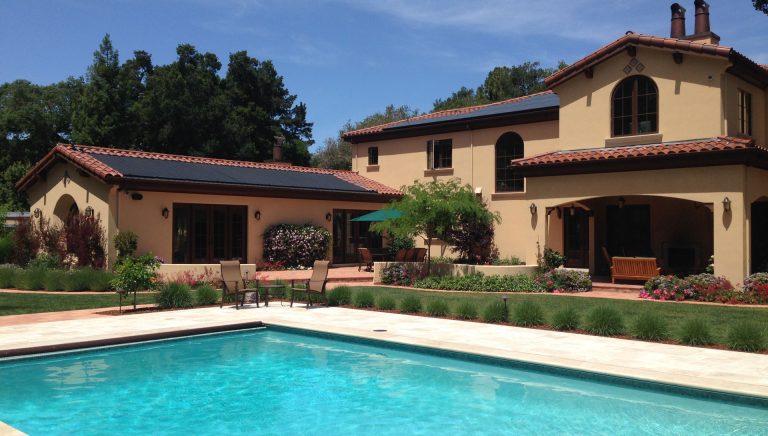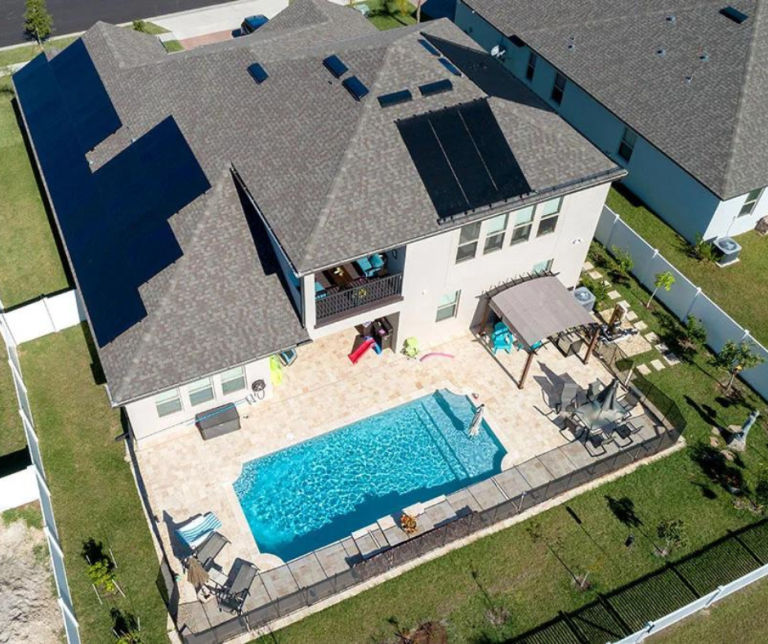Installing an eco-friendly pool heater is one of the best decisions a homeowner can make to reduce environmental impact while enjoying a longer swim season. However, not all pool heaters are created equal. Some systems come with hidden costs or a larger carbon footprint than you may expect.
In this guide, we’ll explore the types of eco-friendly pool heaters and why solar pool heating remains the most sustainable, efficient, and cost-effective option in 2024.

Types of Eco-Friendly Heaters for Your Swimming Pool
When choosing a pool heater, it’s important to understand the differences between the three primary options: gas pool heaters, electric heat pumps, and solar pool heaters.
Gas Pool Heaters: The Rapid but Costly Option
Gas pool heaters use propane or natural gas to warm pool water quickly. While effective for short-term heating, their long-term costs—both financial and environmental—can be significant.
- 2024 Statistics: Gas heaters emit an average of 5,000 pounds of CO₂ annually per pool, making them one of the least eco-friendly options.
- Operational Costs: These heaters can cost $1,700 to $2,000 annually to operate, depending on gas prices and pool size.
- Lifespan: Typically 5-10 years, with higher maintenance needs compared to other systems.
Electric Heat Pump Pool Heaters: Efficiency with Limits
Electric heat pumps draw heat from the air to warm pool water. While more energy-efficient than gas heaters, their performance decreases in colder weather.
- 2024 Statistics: Energy efficiency drops by up to 30% in regions with temperatures below 50°F.
- Operational Costs: Average annual costs range from $700 to $1,000, depending on electricity rates and climate.
- Environmental Impact: While cleaner than gas heaters, they still rely on non-renewable electricity sources in many areas.
Solar Pool Heaters: The Gold Standard of Eco-Friendly Heating
Solar pool heaters use the sun’s radiant energy to heat pool water, making them the most sustainable choice.
- 2024 Statistics: Solar pool heaters reduce greenhouse gas emissions by an average of 6,000 pounds annually compared to gas heaters.
- Operational Costs: Virtually zero after installation, with savings of $1,000 to $1,500 per year in utility costs.
- Lifespan: Solar panels last 15-20 years with minimal maintenance.

Why Solar Pool Heaters Are the Most Eco-Friendly Choice
Zero Emissions for a Cleaner Planet
Solar pool heaters produce no emissions during operation, making them an excellent choice for reducing your carbon footprint. Unlike gas or electric systems, solar heaters leverage renewable energy to provide consistent heating without polluting the environment.
- Regulatory Benefits: States like California have banned gas pool heaters in new constructions, further highlighting the importance of solar alternatives.
Minimal Maintenance and Long Lifespan
Solar pool heaters are built to last with durable, weather-resistant materials. Their simple design means fewer parts to break or replace compared to gas and electric systems. Routine maintenance, such as clearing debris from panels, ensures they operate efficiently for decades.
Financial Benefits of Solar Pool Heating
Long-Term Cost Savings
While solar pool heaters have higher upfront costs, they offer substantial long-term savings:
- Cost Recovery: Systems typically pay for themselves within 3-7 years through energy savings.
Increased Property Value
Installing a solar pool heating system can boost your home’s resale value by appealing to eco-conscious buyers looking for sustainable features.
Key Features of Solar Pool Heating Systems in 2024
Advanced Solar Technology
Solar pool heaters now feature advanced materials and designs that maximize efficiency:
- Selective Coatings: Panels with selective coatings enhance heat absorption, even in cooler climates.
- Durable Construction: High-grade polymers and reinforced mounting systems withstand harsh weather conditions, ensuring longevity.
Compatibility and Customization
Modern solar pool heaters are designed to fit pools of all shapes and sizes. Systems can be tailored to match your heating needs, whether you want to extend your swim season or maintain a specific temperature year-round.

Choosing the Right Eco-Friendly Heater for Your Pool
Factors to Consider
- Climate: Solar pool heaters perform best in sunny regions but remain effective in various climates with proper design.
- Pool Size: Larger pools may require additional panels to maintain desired temperatures.
- Usage Patterns: Year-round swimmers may benefit from hybrid systems that combine solar with a backup heater.
Steps to Get Started
- Assess your pool’s size, location, and energy needs.
- Submit an inquiry to be connected with our Authorized Dealer to design and install your system.
Solar Pool Heaters for a Sustainable Future
In 2024, solar pool heaters remain the most eco-friendly and cost-effective solution for pool heating. They offer homeowners a chance to reduce their environmental impact, save money on utility bills, and enjoy a longer swim season with minimal maintenance.
If you’re ready to make the switch, explore Magen eco-Energy’s Heliocol, SunStar, and SunValue solar pool heating systems. With decades of experience, we provide durable, reliable, and eco-conscious solutions for homeowners looking to create a more sustainable future.


